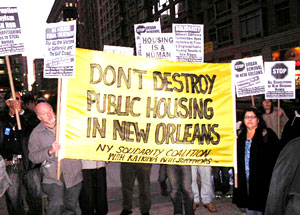- New Bush housing plan would mean more cuts for the poor (FCN, 06-13-2005)
- Cutbacks to Section 8 housing threaten increased homelessness (FCN, 05-02-2004)

NEW YORK (FinalCall.com) – Billed as a protest against demolition of public housing in New Orleans, a demonstration here touched on the destruction of public housing across the nation. Protestors also turned out in Chicago, Los Angeles, the Twin Cities and New Orleans to condemn destruction of public housing, according to organizers.
According to activists, the Department of Housing and Urban Development has laid out plans to demolish New Orleans’ four largest housing developments, some 5,000 units, and replace them with “mixed-income” neighborhoods.
“This will drastically reduce New Orleans public housing by 82 percent at the cost of $762 million,” according to the New York Solidarity Coalition with Katrina & Rita Survivors.
“It’s a scheme to push long-time residents out of prime real estate; and that will drive up rents, so that even the supposedly affordable new units would be out of reach for many of the long-time residents who are fighting to keep the badly needed housing open,” said Ivy Parker, a New Orleans resident.
“There was no damage to those structures, so why can’t the people go home and reoccupy those units? Housing is a human right,” argued Joetta Chestnutt, a Gulf Coast survivor and coalition member. The protest was held Nov. 13.
Derek Norvell, of Concerned Citizens of Greater Harlem, told The Final Call the demolition of public housing is a national problem. “A third of Chicago’s public housing is gone. In New York, we have lost close to 30,000 units,” Mr. Norvell said. He added that Atlanta plans to demolish all of its public housing.
Activists charge that HUD’s demolition strategy is part of a longstanding campaign to dismantle the U.S. public housing system that began in the 1970s. The campaign, they say, was based on the belief that concentration of the poor into segregated ghettos condemned them to a permanent cycle of poverty, crime and drugs. Much of the housing is also located on land that has become valuable over the years and has attracted the attention of developers.
According to the National Low-Income Housing Coalition, HUD began its demolition program in earnest in the 1990s by encouraging the destruction of 100,000 units. Since then, local public housing authorities across the nation have destroyed at least 78,015 units, under HOPE VI, a national revitalization program. Those units are not replaced on a one for one basis.
“Sure we have a war in Iraq, but we also have a war here in America against poor people,” NY ACORN executive director Bertha Lewis told The Final Call. Public housing in our cities is lost, and the Democrats can do nothing to stop this administration, said Ms. Lewis.
“So, until there is a new administration there will be no commitment to public housing. We have been crying in the wilderness for a long time now,” she said.
The longtime ACORN activist talked on her cell phone to The Final Call while attending a press conference in lower Manhattan, calling on New York City’s lawmakers to end discrimination against Section 8 families.
Citing the refusal of landlords to lease to Section 8 families, and a recent dramatic increase in the number of New York families receiving the federal subsidy, ACORN wants the city to adopt a law to ensure that landlords will rent to Section 8 tenants, or face penalties. Chicago, New Jersey and Washington, D.C. all have similar anti-discrimination laws.
Given that HUD is ignoring the pleas of housing advocates to stop demolition, “the only thing people can do is take things into their own hands. They are going to have to take over the buildings,” said Ms. Lewis.
The Black community must educate itself on developing the land that is being laid bare by HUD, said Deidre Brewster of the Chicago-based Coalition to Protect Public Housing. “We realize we don’t have HUD’s ear, so we must turn to our elected officials. When we can do that we will turn the corner,” Ms. Brewster said.
According to Ms. Lewis, the years 2008-2009 will be the time that ACORN plans to engage the city council’s Black and Latino Caucus, the Black and Latino Caucus of the NY State Legislature, “and our Black Caucus friends in Washington.”
“They have the numbers to stop this affordable housing erosion and we mean to see that they do their jobs,” Ms. Lewis said.












